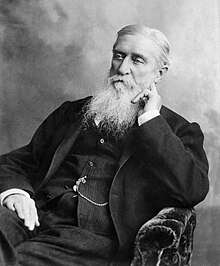James FitzGerald
|
The Honourable James FitzGerald MP |
|
|---|---|

James Edward Fitzgerald ca 1890
|
|
| 6th Minister of Native Affairs | |
|
In office 12 August 1865 – 16 October 1865 |
|
| Member of the New Zealand Parliament for Lyttelton |
|
|
In office 1853 – 1857 |
|
| Member of the New Zealand Parliament for Ellesmere |
|
|
In office 1862 – 1866 |
|
| Member of the New Zealand Parliament for City of Christchurch |
|
|
In office 1866 – 1867 |
|
| 1st Superintendent of Canterbury Province | |
|
In office 20 Jul 1853 – Oct 1857 |
|
| Personal details | |
| Born | 4 March 1818 Bath, England |
| Died | 2 August 1896 (aged 78) Wellington, New Zealand |
| Spouse(s) | Frances (Fanny) Erskine Draper (married 1850) |
| Relations |
Richard Fitzgerald (grandfather) Lucius O'Brien (grandfather) Gerard Fitzgerald (brother) |
| Signature | |
James Edward FitzGerald (4 March 1818 – 2 August 1896) was a New Zealand politician. According to some historians, he should be considered the country's first Prime Minister, although a more conventional view is that neither he nor his successor (Thomas Forsaith) should properly be given that title. He was a notable campaigner for New Zealand self-governance. He was the first Superintendent of the Canterbury Province.
FitzGerald was born on 4 March 1818 in Bath, England. His parents, Gerald FitzGerald and Katherine O'Brien, were Irish, and FitzGerald is known to have cherished his connection with Ireland. Both his grandfathers, Colonel Richard Fitzgerald and Sir Lucius O'Brien, were MPs in the Irish House of Commons. He was educated first in Bath, and then at Christ's College of the University of Cambridge. He initially sought a commission in the Royal Engineers, but poor eyesight made this impossible. Instead, he began working for the British Museum's Antiquities department, and became the museum's Assistant Secretary.
FitzGerald gradually became concerned with the alleviation of poverty, an interest spurred by the problems of the Irish Potato Famine. His suggested solution to poverty was emigration to the colonies, where more opportunities might exist for prosperity. As such, he became heavily involved in the promotion and planning of new colonies. In 1849, he became secretary of the Canterbury Association, responsible for the Anglican settlement at Christchurch, New Zealand. The settlement was well organised by the Canterbury Association; the printing press for the colony's newspaper was sent with the First Four Ships (FitzGerald becoming the first editor of the Lyttelton Times) and the main building for the settlement's school, known these days as Christ's College Big School, was designed by FitzGerald in 1850 in England. The building was constructed in 1863 and is the only building known to have been designed by FitzGerald.
...
Wikipedia
